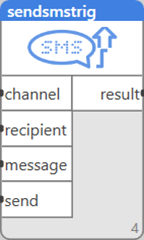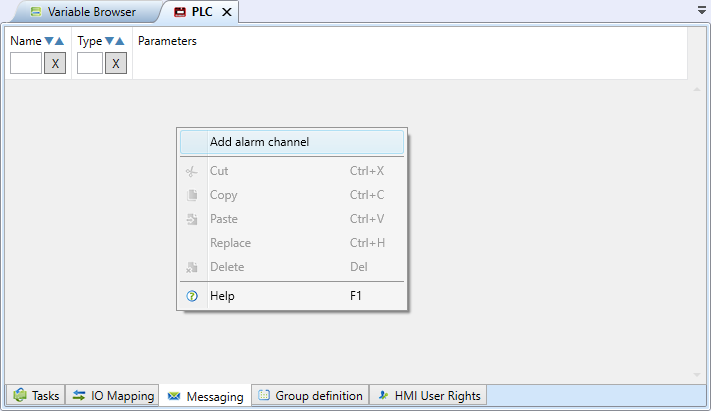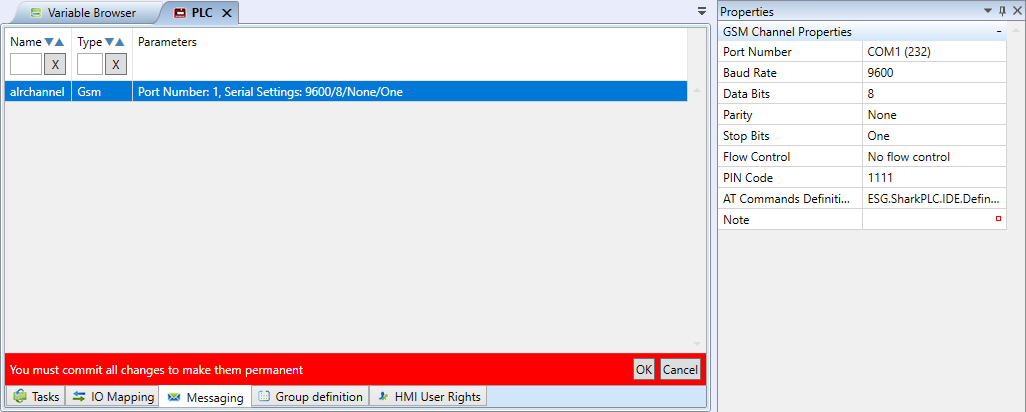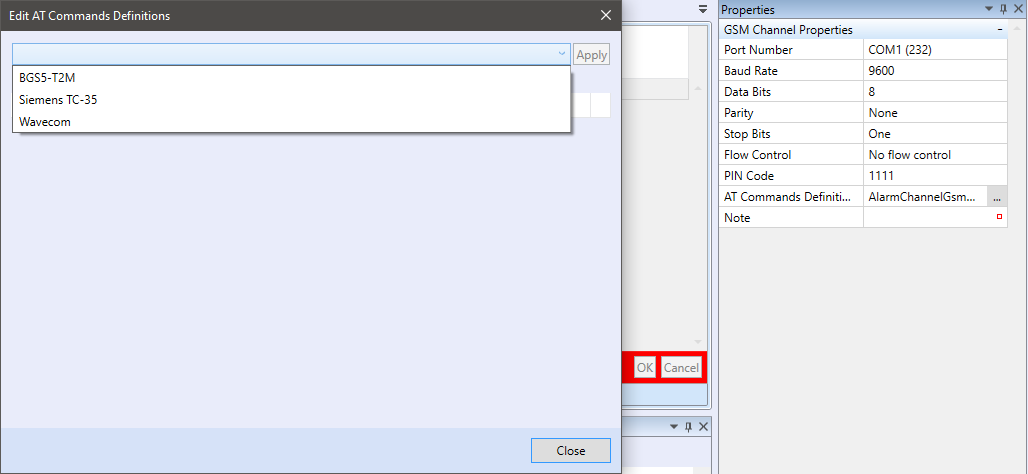Send SMS - FUPLA
Block name
SENDSMSTRIG
ST call
It is better to use the sendsms block for ST programs.
Library
MESSAGING
Version
V1.0
Description
The function sends a SMS at each transition of the control variable send from FALSE to TRUE. If there have to be sent more messages at a time, the block must be used multiple times or some sort of switcher for recepients has to be created. Every GSM gate has its queue limit, for example maximum four messages can be queued. It is highly recommended to send the messages with some pauses, for example a pause between two messages can be 10 seconds. Messages that can not be handled by the queue are discarded in the GSM modem.
Inputs
| Input | Type | Description |
| CHANNEL | STRING | communication connection definition (set in PLC properties, see below) |
| RECIPIENT | STRING | recipient phone number |
| MESSAGE | STRING | SMS message text (ASCII) |
| SEND | BOOL | command to send the SMS |
Outputs
| Output | Type | Description |
| RESULT | SINT | Numeric status; result of the system settings check |
Function
Each rising edge on the send input sends a SMS from the predefined GSM modem to the recipient phone number. The SMS text is taken from the message variable.
The channel variable refers to the predefined communication channel. This has to be created in the PLC properties: doubleclick the PLC and select Message definition, then right-click the context menu and Add alarm channel.
Now, define the channel name which is the value of the channel variable. As next, the GSM connection type must be defined: click to select the channel and set the port to communicate to the modem in the channel properties. Set the channel communication properties. When using mark220 rev. 2.0 or mark320 rev. 2.0 set the software data flow control - RTS / CTS. If the SIM card is secured by a PIN, enter the PIN here. Finally, confirm all changes by clicking OK in the red dialogue.
If some of the predefined modem types is used, like Siemens TC-35 chipset, or Wavecom, it is possible to set in the AT command settings predefined commands to set up the modem. Then click the Apply button. The necessary AT commands are then added to the table. Click the Close button and confirm by clicking OK in the red dialogue. If another modem type is used, the AT command sequence has to be entered manually. (In case of unsupported modem types please contact the Domat Control System technical support.)
The output variable result indicates the result of the system settings check.
| Status | Meaning |
| 0 | OK |
| 1 | Unknown variable |
| 2 | Write failed |
| 3 | Size mismatch |
| 4 | Unspecified failure |
| 5 | Write denied |
| 6 | Invalid status |
| 7 | Image could not be read |
| 8 | Full e-mail box |
| 9 | Recipient address too long |
| 10 | Sender address too long |
| 11 | Subject too long |
| 12 | Message too long |
| 13 | Server name too long |
| 14 | User name in message definition too long |
| 15 | Password in message definition too long |
| 16 | Unknown channel |
| 17 | Unknown source coding |
| 18 | Unknown target coding |
| 19 | Conversion failed |
| 20 | Invalid conversion source |
| 21 | Congested conversion source |
| 22 | Congested conversion path |
| 23 | Connected |
| 24 | Error - status value can not be determined |
| 25 | Impossible to open port or init GSM modem (e.g. COM port number wrong) |
| 26 | Timeout when executing AT command (default 2 s) |
| 27 | Unknown AT command |
| 28 | Invalid image |
| 29 | LSB not valid |
| 30 | Image marked as invalid |
| 31 | Empty |
| 32 | Overlap |
| 33 | Process restoration |
| 34 | Busy |
| 35 | Port in use |
| 36 | GUID error |
| 37 | Invalid CRC |
| 38 | Invalid stack type |
| 39 | Invalid task |
| 40 | Out of specified range |
| 41 | GSM modem error |
| 42 | GSM channel error (wrong PIN, network not available, …) |
| 43 | Waiting for PIN |
| 44 | Waiting for PUK |
| 45 | Wrong PIN entered |
| 46 | Service - GSM Prompt |
| 47 | GSM modem inbox full (see below) |
| 48 | Truncated |
| 49 | Unknown device |
| 50 | Unbalanced parenthesis |
| 51 | Invalid class |
| 52 | No free memory |
| 53 | File not found |
| 54 | Full run |
| 55 | Stopped |
| 56 | Unknown metadata |
| 57 | Bus error |
| 58 | NVRAM not available |
| 59 | Configuration error |
| 60 | Invalid port number |
| 61 | No device |
Using the X3 communication port on the Wall PLC
For communication with GSM modem GSM-BGS-T2M or GSM-BGS-E2N via port X3 in RS-232 mode, it is necessary to use a serial cable D-SUB 09 male-male connected as 2-3, 3-2, 5-5 (crossed). It is recommended to disable flow control both at the PLC and at the modem (AT\Q0).
Error 47 - Full GSM modem buffer
Full GSM modem inbox occures if there are multiple alarm SMS requirements in a short time interval. Full modem inbox is cleared only after a rising edge is brought to the send variable of the “sendsmstrig” function block. The image below shows possible fix of SMS buffer congestion. In front of the OR function there is a pulse encoder which returns False on the Q output after time defined in the input variable PT. If the sendsmstrig function block returns 47 in its output variable Result, the EQ function returns True and this enables the pulse generator. The pulse generator must have set the TFALSE time interval long enough (10 s), and only 1 s interval in the TTRUE parameter. This repeats the cycle to send the SMS until the Full GSM modem buffer message is cleared.





